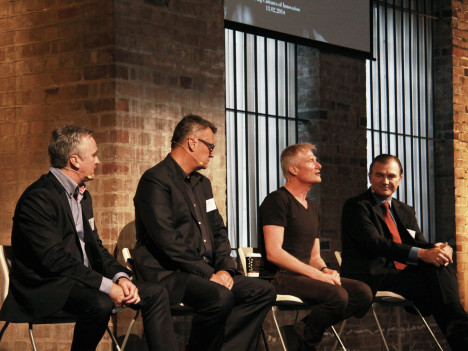Deloitte CMO: Australia’s ‘tall poppy syndrome’ holds back innovation

L:R Dominic Walsh MD of Landor Australia, Mark Collis, director of Innovation Factory, James Sykes, VP marketing director of Beam of David Redhill chief marketing officer of Deloitte Australia
David Redhill, chief marketing officer of Deloitte has told a forum that he fears “tall poppy syndrome” is holding back innovation in Australia.
Speaking at a forum this morning, hosted by branding consultancy Landor Australia, Redhill said Australia’s “cultural cringe” was limiting it.
“There is a cultural cringe or the ‘tall poppy syndrome’ where people don’t like to be seen as champions of change and stark innovators,” said Redhill.
“And they are not supported. Maybe it’s something in the Australian psyche that we don’t want to stand out.”
Redhill was joined on the panel by former head of brand and innovation at Telstra, Mark Collis, James Sykes, marketing director of premium spirits for Beam and Dominic Walsh, managing director of Landor Australia.
Collis told the panel about his challenges with rebranding Telstra and said innovation and change only came about because of a willingness from the rest of the team to evolve.
“Leadership is crucial. I don’t think I could have gone in there and convinced David Thodey and the team to do X,Y or Z with the Telstra brand,” said Collis, who is now director of Innovation Factory.
“They had already realised that they needed a change. I was very lucky in that regard,” he said.
He also added that one of the challenges of driving innovation for business leaders was the constant ambiguity and fuzziness that comes with change.
“Leadership must embrace innovation even though it doesn’t come with a set outcome,”said Collis, “there is a lot of ambiguity and fuzziness that comes with innovation.”
Sykes said there was often a major disparity between senior management and the rest of the company adding: “There is a often a gap between senior management and their comprehension of innovation of what it is and what it should do and the folks at the folks at the bottom who have to do that shit.
“The result is an air sandwich between the big people and the little people and that comes about because people believe they need a culture that embraces co-participation. Everyone gives that lip service but they never organise themselves to make sure it happens.”
Redhill agreed and said: “There is a problem, it is this big people vs little people syndrome.”




David is a good guy. WTF is landor?
User ID not verified.
“WTF is landor?” – really? Theres this thing called google…
User ID not verified.
Landor is one of the world’s preeminent branding consultancies.
For the uninitiated: http://www.landor.com
User ID not verified.
This is a CEO problem. The CEO is responsible for, among other things – wait for it -Growth! I have seen so many strategy/innovation/development type roles that lack a simple objective like this one : “that in three/five years x% of our revenues and y % of our profits come from sectors/segments/products/services that do not currently exist.”
It’s called a Growth Agenda and it is very rarely seen these days. It is cultural and comes from the top.
I wonder if these Companies have this type of statement embedded in their work? I am pretty sure that at least one does not…
User ID not verified.
This especially extends to the public sector where mediocrity is celebrated and expected. Innovation is not rewarded and politicians continue to suppress the people that work in the bureaucracy. Sure leadership is lacking, no doubt, it’s a tragic state of affairs. Where the hell is innovative and entrepreneurial government. Last time I checked Victoria under Kennett seem to get it.
User ID not verified.
Everyone talks about innovation but so few people actually know what it is when they encounter it. In most cases, there is such a disconnect between key parts of the business that innovation is stifled. Management set the strategy, but IT, Marketing and Human Capital operate in their own little bubbles, no talking between departments let alone embracing a diverse range of ideas that come from collective thinking.
User ID not verified.
Australia is drowning under the post graduate “high achievers” who have a nice piece of paper and no talent to intuitively seek, elevate air execute on innovation, as they have spent their lives looking in rear vision mirrors.
HR are the one’s filtering talent based on their Uni fee investment = sinking Oz
User ID not verified.
Soon it will dawn on Australia’s CMO’s that the new models agencies are so keen to promote are no more than new ways of creating the same old things for the same amount of money.
User ID not verified.
This is why Australia finds it difficult to compete. Its a cultural thing.
Good for people who just want to keep their head down, do what they are told, don’t propose any new idea etc..
Not good for those who want to differentiate themselves via creativity, strategic thinking etc.
This is why Australia has been a consumer society for decades and will continue to be a consumer society, dependant on others worldwide for their standard of living.
User ID not verified.